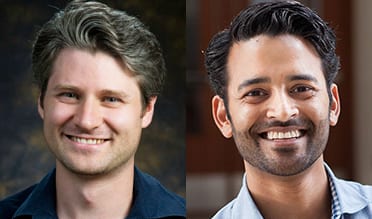Two teams of investigators were each awarded $40,000 in pilot project funding by the NSF-Simons Center for Quantitative Biology to initiate new research projects in quantitative developmental biology.
Funding was awarded to Northwestern University investigators Christian Petersen (Molecular Biosciences) and Madhav Mani (Engineering Sciences and Applied Mathematics) for their project Adult Regeneration and the Formation of Cartesian Tissue Axes.
University of Illinois Urbana-Champaign investigators Xin Li (Cell and Developmental Biology) and Dave Sihai Zhao (Statistics) received funding for their project Computational Reconstruction of Gene-Gene Dynamics in Temporal Patterning of Drosophila Medulla Neuroblasts from Single-Cell RNA-Seq.
Adult Regeneration and the Formation of Cartesian Tissue
This project seeks to elucidate the developmental mechanisms that ensure precise spatial organization of cells along orthogonal body axes. The mechanism in question are dynamic signaling pathways between the axes, specifically asking whether or not one axis is the primary axis from which all other information is distributed in a sequential and hierarchical manner.
The research will be completed using adult freshwater planarians (flatworm) as the model organism, whose ability to regenerate along orthogonal body axes provides a simpler model than embryonic models. The experimental data will be used to evaluate of mathematical models of axis formation in regeneration. The project will reveal whether orthogonal axes are defined hierarchically or independently.
Computational Reconstruction of Gene-Gene Dynamics in Temporal Patterning of Drosophila Medulla Neuroblasts from Single-Cell RNA-Seq
This project seeks to define the mechanisms that control sequential temporal transitions in neural stem cells (neuroblasts). These stem cells sequentially generate a defined order of over 70 different neural cell types as they age, yet the molecular basis of genomic regulation which underpins the temporal transitions is unknown.
The study of these neuroblasts temporal transitions will be completed using neuroblasts from the medulla (part of the visual processing center of the brain) of the model organism Drosophila (fruit fly). Experimental data will be obtained from single-cell RNA sequencing to develop new mathematical models and statistical algorithms to reconstruct gene to gene interaction dynamics.
The next application deadline is May 31, 2019. For instructions on how to apply please visit https://www.quantitativebiology.northwestern.edu/opportunities/pilot-projects-program/ .
The Pilot Projects Program is made possible through the National Science Foundation award 1764421 and Simons Foundation/SFARI award 597491-RWC.




